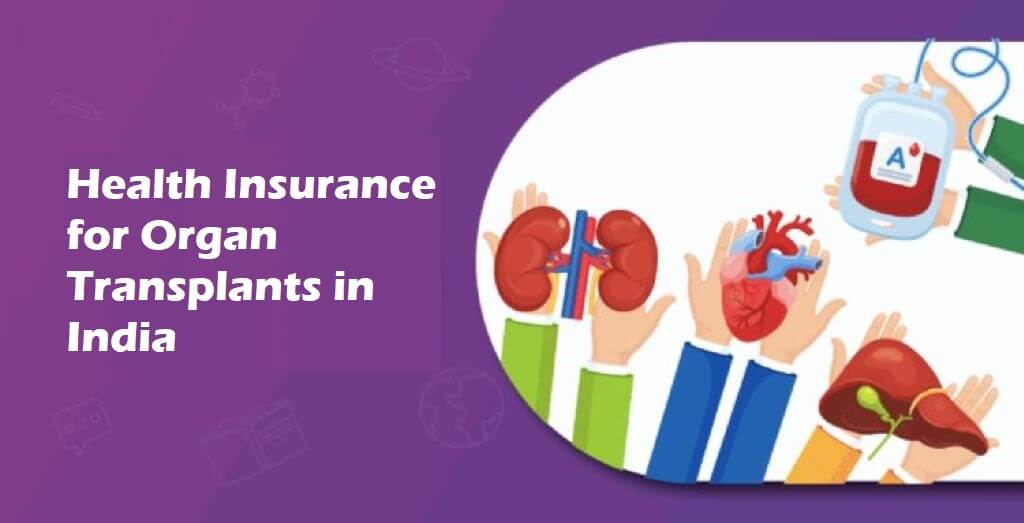There is no denying that organ failure can be due to various reasons, such as disease, injury, or congenital conditions. Organ transplantation is a surgical procedure that involves replacing a failed organ with a healthy organ obtained from another person, the organ donor. Organ transplantation aims to restore the recipient’s organ function, improve their quality of life, and extend their lifespan. However, it is important to note that organ transplantation is a complex medical procedure with potential risks and complications.
The donated organ can come from living donors, such as family members, close relatives, or deceased donors who have consented to organ donation before death. It is no secret that the cost of organ transplantation itself can be huge.
Did you know?
As per the reports from India Today in 2023, the cost of an organ transplant is at least Rs. 15-Rs.20 Lakhs in India.
In response to the growing demand for organ transplant surgeries in India, several insurance providers have recognized the need for comprehensive coverage for both the organ recipient and the organ donor.
Read on to learn more about health insurance for organ transplantation in India.
Types of Organ Transplants in India
Here are the different types of organ transplants in India. Let’s take a look at each one of them.
- Heart Transplant: A heart transplant is a surgical procedure performed to replace a patient’s damaged or diseased heart with a healthy heart obtained from a donor who has experienced brain death.
- Lung Transplant: Also known as Pulmonary transplantation, a lung transplant is a surgical procedure in which a patient’s damaged or diseased lungs are replaced with healthy lungs obtained from a donor. The donor lungs can be sourced from either a living donor or a deceased donor.
- Liver Transplant: Hepatic transplantation, commonly known as liver transplantation, is a surgical procedure in which a diseased or failing liver is replaced with a healthy liver obtained from a donor.
- Cornea Treatment: Phototherapeutic keratectomy (PTK) is a laser treatment that helps address certain corneal dystrophies and remove scar tissue from the cornea. The cornea is the clear, dome-shaped front part of the eye that helps focus light onto the retina for clear vision.
- Kidney Transplant: Renal transplantation, also known as, kidney transplantation, is a surgical procedure performed on patients with end-stage kidney diseases. It involves replacing a diseased or non-functioning kidney with a healthy kidney received from the donor.
List of Health Insurance Plans for Organ Transplant
Many health insurance plans cover organ transplant expenses. For your reference, we have listed a few of the plans. Let’s discuss them in detail!
| Plan Name | Details |
| HDFC Critical Illness Insurance | Minimum Age- 5 Years Maximum- 65 Years Sum Insured- Rs. 5 lacs, Rs. 7.5 lacs and Rs. 10 lacs. |
| Max Life Critical Illness Insurance Cover | Minimum- 18 Years Maximum- 85 Years Illness Covered- 64 |
| Bajaj Allianz Critical Illness Insurance | Minimum- 18 Years Maximum- 65 Years • Sum Insured options of Rs. 100000/- to Rs. 5000000/- for age group 6 years to 60 years. • Sum Insured options of Rs. 100000/- to Rs. 500000/- for the age group 61 years to 65 years |
| SBI Critical Illness Insurance | Minimum- 18 Years Maximum- 65 Years Sum Insured: Up to Rs. 10 Lakhs |
| Manipal Cigna Critical Illness Insurance | Minimum- 18 Years Maximum- 65 Years Sum Insured- Rs. 1 Lakh to Rs. 25 Crore |
Things to Remember Before Buying Medical Insurance for Organ Transplantation
If you are considering buying a critical illness policy for organ transplantation in India, here are some important things to remember;
- Exclusions for Donor Medical Expenses
It is no secret that medical treatment costs associated with the organ donor’s procedure for harvesting the organ are typically not covered under organ transplantation insurance policies.
- Compliance With Transplantation Guidelines
Healthcare facilities adhere to strict guidelines governing organ transplantation procedures. Donors must comply with the regulations outlined in the Transplantation of Human Organs Act 1994. It’s essential to ensure that the organ donation is for personal use only and meets the legal requirements set forth by the legislation.
- Waiting Period for Coverage Benefits
Organ transplantation insurance policies often impose a waiting period before coverage benefits become available. This waiting period typically ranges from 2 to 4 years, during which the policyholder must maintain continuous coverage without making claims related to organ transplantation.
Final Thoughts
In conclusion, proactive communication with hospitals regarding the breakdown of costs for both donors and recipients is crucial for individuals undergoing organ transplant surgeries. Selecting the appropriate critical illness policy is paramount to safeguarding oneself from the potentially significant financial impact of organ-related expenses. It’s essential to thoroughly evaluate policy options to ensure comprehensive coverage for organ transplantation and associated medical costs.
Frequently Asked Questions
Yes, under the donor expenditure cover provision of health insurance, liver and heart transplants are covered.
Your health insurance policy may allow you to claim the honor’s hospital expenses. Therefore, the hospitalisation expenses related to organ harvesting will be covered by critical illness insurance.
No, it’s not expensive to have critical illness insurance. Having a critical illness insurance policy is a cost-effective way to improve your overall defence against health-related threats.








